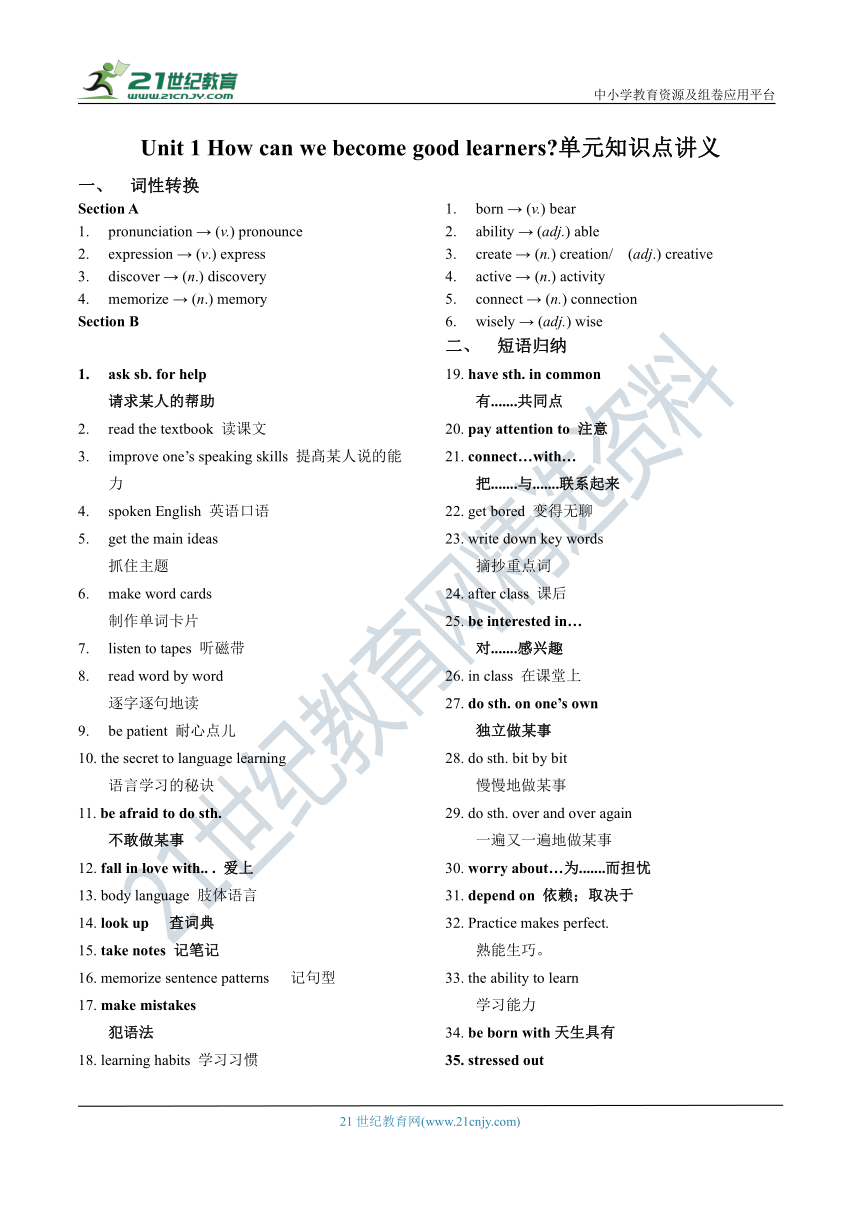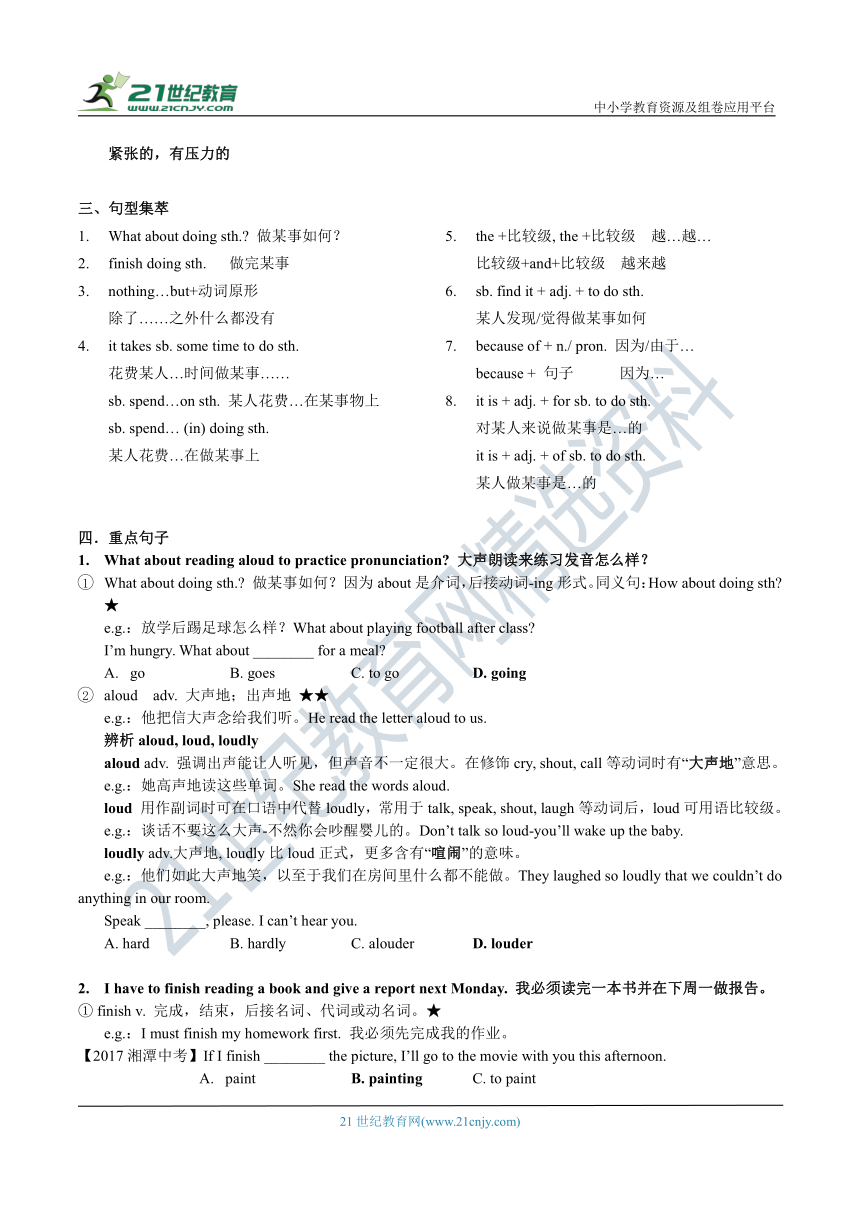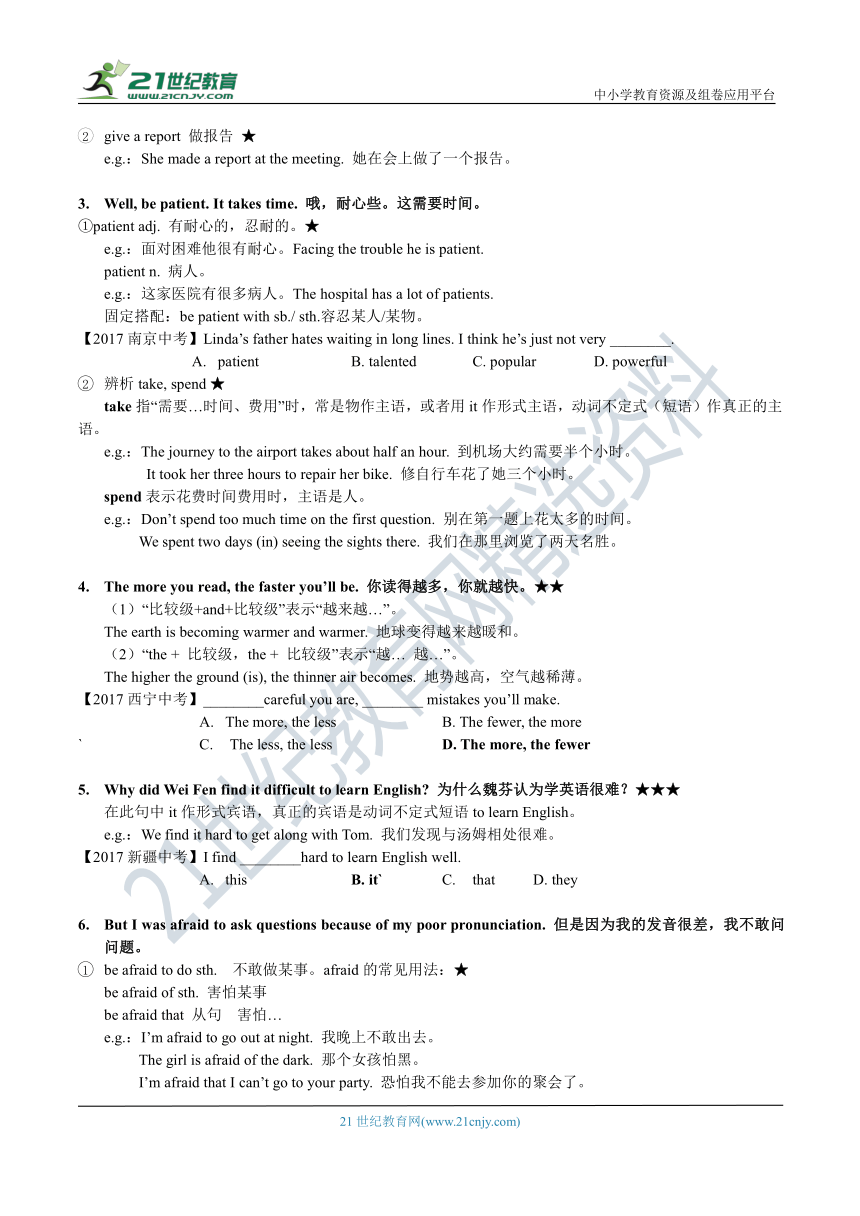Unit 1 How can we become good learners单元知识点讲义
文档属性
| 名称 | Unit 1 How can we become good learners单元知识点讲义 |  | |
| 格式 | zip | ||
| 文件大小 | 1.2MB | ||
| 资源类型 | 试卷 | ||
| 版本资源 | 人教新目标(Go for it)版 | ||
| 科目 | 英语 | ||
| 更新时间 | 2020-02-05 20:05:52 | ||
图片预览



文档简介
中小学教育资源及组卷应用平台
Unit 1 How can we become good learners?单元知识点讲义
词性转换
Section A
pronunciation → (v.) pronounce
expression → (v.) express
discover → (n.) discovery
memorize → (n.) memory
Section B
born → (v.) bear
ability → (adj.) able
create → (n.) creation/ (adj.) creative
active → (n.) activity
connect → (n.) connection
wisely → (adj.) wise
短语归纳
ask sb. for help
请求某人的帮助
2. read the textbook 读课文
3. improve one’s speaking skills 提髙某人说的能力
4. spoken English 英语口语
5. get the main ideas
抓住主题
6. make word cards
制作单词卡片
7. listen to tapes 听磁带
8. read word by word
逐字逐句地读
9. be patient 耐心点儿
10. the secret to language learning
语言学习的秘诀
11. be afraid to do sth.
不敢做某事
12. fall in love with.. . 爱上
13. body language 肢体语言
14. look up 查词典
15. take notes 记笔记
16. memorize sentence patterns 记句型
17. make mistakes
犯语法
18. learning habits 学习习惯
19. have sth. in common
有.......共同点
20. pay attention to 注意
21. connect…with…
把.......与.......联系起来
22. get bored 变得无聊
23. write down key words
摘抄重点词
24. after class 课后
25. be interested in…
对.......感兴趣
26. in class 在课堂上
27. do sth. on one’s own
独立做某事
28. do sth. bit by bit
慢慢地做某事
29. do sth. over and over again
一遍又一遍地做某事
30. worry about…为.......而担忧
31. depend on 依赖;取决于
32. Practice makes perfect.
熟能生巧。
33. the ability to learn
学习能力
34. be born with天生具有
35. stressed out
紧张的,有压力的
三、句型集萃
What about doing sth.? 做某事如何?
finish doing sth. 做完某事
nothing…but+动词原形
除了……之外什么都没有
it takes sb. some time to do sth.
花费某人…时间做某事……
sb. spend…on sth. 某人花费…在某事物上
sb. spend… (in) doing sth.
某人花费…在做某事上
the +比较级, the +比较级 越…越…
比较级+and+比较级 越来越
sb. find it + adj. + to do sth.
某人发现/觉得做某事如何
because of + n./ pron. 因为/由于…
because + 句子 因为…
it is + adj. + for sb. to do sth.
对某人来说做某事是…的
it is + adj. + of sb. to do sth.
某人做某事是…的
四.重点句子
What about reading aloud to practice pronunciation? 大声朗读来练习发音怎么样?
What about doing sth.? 做某事如何?因为about是介词,后接动词-ing形式。同义句:How about doing sth? ★
e.g.:放学后踢足球怎么样?What about playing football after class?
I’m hungry. What about ________ for a meal?
go B. goes C. to go D. going
aloud adv. 大声地;出声地 ★★
e.g.:他把信大声念给我们听。He read the letter aloud to us.
辨析aloud, loud, loudly
aloud adv. 强调出声能让人听见,但声音不一定很大。在修饰cry, shout, call等动词时有“大声地”意思。
e.g.:她高声地读这些单词。She read the words aloud.
loud 用作副词时可在口语中代替loudly,常用于talk, speak, shout, laugh等动词后,loud可用语比较级。
e.g.:谈话不要这么大声-不然你会吵醒婴儿的。Don’t talk so loud-you’ll wake up the baby.
loudly adv.大声地, loudly比loud正式,更多含有“喧闹”的意味。
e.g.:他们如此大声地笑,以至于我们在房间里什么都不能做。They laughed so loudly that we couldn’t do anything in our room.
Speak ________, please. I can’t hear you.
A. hard B. hardly C. alouder D. louder
I have to finish reading a book and give a report next Monday. 我必须读完一本书并在下周一做报告。
① finish v. 完成,结束,后接名词、代词或动名词。★
e.g.:I must finish my homework first. 我必须先完成我的作业。
【2017湘潭中考】If I finish ________ the picture, I’ll go to the movie with you this afternoon.
paint B. painting C. to paint
give a report 做报告 ★
e.g.:She made a report at the meeting. 她在会上做了一个报告。
Well, be patient. It takes time. 哦,耐心些。这需要时间。
①patient adj. 有耐心的,忍耐的。★
e.g.:面对困难他很有耐心。Facing the trouble he is patient.
patient n. 病人。
e.g.:这家医院有很多病人。The hospital has a lot of patients.
固定搭配:be patient with sb./ sth.容忍某人/某物。
【2017南京中考】Linda’s father hates waiting in long lines. I think he’s just not very ________.
patient B. talented C. popular D. powerful
辨析take, spend ★
take指“需要…时间、费用”时,常是物作主语,或者用it作形式主语,动词不定式(短语)作真正的主语。
e.g.:The journey to the airport takes about half an hour. 到机场大约需要半个小时。
It took her three hours to repair her bike. 修自行车花了她三个小时。
spend表示花费时间费用时,主语是人。
e.g.:Don’t spend too much time on the first question. 别在第一题上花太多的时间。
We spent two days (in) seeing the sights there. 我们在那里浏览了两天名胜。
The more you read, the faster you’ll be. 你读得越多,你就越快。★★
(1)“比较级+and+比较级”表示“越来越…”。
The earth is becoming warmer and warmer. 地球变得越来越暖和。
(2)“the + 比较级,the + 比较级”表示“越… 越…”。
The higher the ground (is), the thinner air becomes. 地势越高,空气越稀薄。
【2017西宁中考】________careful you are, ________ mistakes you’ll make.
The more, the less B. The fewer, the more
` C. The less, the less D. The more, the fewer
Why did Wei Fen find it difficult to learn English? 为什么魏芬认为学英语很难?★★★
在此句中it作形式宾语,真正的宾语是动词不定式短语to learn English。
e.g.:We find it hard to get along with Tom. 我们发现与汤姆相处很难。
【2017新疆中考】I find ________hard to learn English well.
this B. it` C. that D. they
But I was afraid to ask questions because of my poor pronunciation. 但是因为我的发音很差,我不敢问问题。
be afraid to do sth. 不敢做某事。afraid的常见用法:★
be afraid of sth. 害怕某事
be afraid that 从句 害怕…
e.g.:I’m afraid to go out at night. 我晚上不敢出去。
The girl is afraid of the dark. 那个女孩怕黑。
I’m afraid that I can’t go to your party. 恐怕我不能去参加你的聚会了。
I am afraid ________in the river.
swim B. to swim C. swims D. swimming
辨析because of, because ★
because of 因为,后接名词或代词。
e.g.:The girl can’t go to school because of her illness. 那个女孩因为生病不能去上学。
because 因为,后接原因状语从句,或者用来对why引起的特殊疑问句进行回答。
e.g.:The girl can’t go to school because she is ill. 那个女孩不能上学, 因为她生病了。
【2017西安中考】--- ________the heavy rain, we didn’t go camping yesterday.
--- What a pity!
Because that B. Because of C. Instead of D. As for
But because I wanted to understand the story, I looked them up in a dictionary. 但是因为我想理解这个故事,所以我在字典里查了它们的意思。★
look...up (在字典、参考书或电脑中)查阅
e.g.:I looked it up in the dictionary. 我在字典里查过它。
【2017云南中考】You don’t have to ________every new word in the dictionary while reading.
look for B. look up C. look at D. look after
I don’t know how to increase my reading speed. 我不知道如何提高我的阅读理解速度。
increase v.增加,增长 ★
increase by + 倍数或百分数:增加了…倍,增加了百分之…
e.g.:Compared with last year, our coal output has increased by three times. 与去年相比,我们的煤产量增加了3倍。
increase to + 具体增长后的数字:增加到了…
e.g.:Our coal output has increased to 6 million tons this year. 今年我们的煤产量增加到了600万吨。
The population of this city has increased ________ 35 percent.
by B. to C. with D. up
②speed n.速度。★
e.g.:He works with amazing speed. 他工作起来速度奇快。
固定搭配:at speed高速地,快地;at a speed of…以…的速度。
The train is travelling ________ a speed of sixty miles an hour.
by B. at C. in D. with
…, your brain is more active and it is also easier for you to pay attention to it for a long time. ….,你的大脑会更加活跃,你也会更容易长时间地关注它。★★
It is + adj. + for sb. to do sth. 对某人来说做某事是…的,此结构中形容词修饰的是动作。
e.g.:It is important for us to protect giant pandas. 对我们来说,保护大熊猫是重要的。
It is + adj. + of sb. to do sth.某人做某事是…的,此结构中形容词修饰人。
e.g.:It is kind of you to save the dog. 你尽力救这只狗,你太善良了。
It is + adj. + to do sth. 做某事是…的。
It’s not polite ________others waiting for a long time.
keep B. keeps C. keeping D. to keep
Even if you learn something well, you will forget it unless you use it. 即使某个东西你学得很好,如果你不用它,你就会忘了它。★
even if即使,纵然,虽然。
e.g.:I like her, even if she can be annoying at times. 尽管她有时可能很烦人,我还是喜欢她。
________ he could not swim, he jumped into the lake.
A. Because of B. Even if C. Instead of D. If
unless conj.如果不,除非,在句中引导一个条件状语从句,相当于if…not,引导的从句常用一般现在时代替一般将来时。
e.g.:I will not go unless I am invited by her. 如果她不邀请我,我就不去。
The sports meeting will continue________ it rains this afternoon.
A. if B. since C. as soon as D. unless
Everything that you learn becomes a part of you and changes you, so learn wisely and learn well. 你学到的每样东西都成为你的一部分并改变着你,因此要聪明地学习并且好好地学。
everything为不定代词,意为“每件事”。其后的定语从句常用that引导。★
e.g.:I know everything that they are talking about. 我知道他们正在讲的每一件事情。
【2017杭州中考】Being blind is something ________most people can’t imagine.
who B. what C. that D. whom
wisely adv. 明智地,聪明地 ★
e.g.:She nodded wisely. 她聪明地点了点头。
He wisely (wise) decided to tell the truth.
五、语法归纳: 动名词
1. 概念:动词的-ing形式,具有动词的特征同时又具有名词的特征。
2. 否定形式:not + 动词的-ing形式
3. 用法:
(1)作主语
Driving in heavy traffic makes me nervous. 交通拥挤时开车使我紧张。
Crying over spilt milk is no use. 覆水难收。
动词的-ing形式作真正的主语时常用语句型:
It is no use doing…./ It is useless doing…/ It is no good doing…
It is no use crying over spilt milk. 覆水难收。
It is no good arguing with him. 和他争吵没好处。
It is useless remembering words only. 只记单词是没有用的。
【2017四川内江】39. Our English teacher often says to us, “____ English well is very important”
A. Learn B. Learning C. Learned D. To learning
【2017 甘肃白银】36. _______ honest is the first thing people should learn.
A. Being B. Look C. Be D. Become
(2)作宾语【中考重点考察】
a. 作动词的宾语:下面这些动词后面只能接动名词作宾语:
enjoy, finish, practice, mind, avoid, keep, suggest, imagine, consider, escape, admit, miss…
b. 作介词的宾语:介词后面的动词需要用动名词形式:
give up, put off, look forward to, pay attention to, feel like, prevent from, get down to, lead to…
【四川宜宾】—Would you mind ______ in the dining hall?
—Of course not.
A. not to smoke B. not smoking C. smoke D. not smoke
【四川雅安】一Can you finish ______ these books before 10 o'clock?
一Yes, I can.
A. to read B. read C. reads D. reading
【湖南邵阳】— What about ______ a rest?
— Let's go for a walk.
A. to take B. take C. taking
【2017四川广安】— I’ m looking forward to _____my parents soon. What about you?
— Me too.
A. seeing B. see C. saw
【2017 上海】The retired couple enjoy _______ photos. They always go out with their cameras
A. take B. took C. to take D. taking
【黑龙江绥化】一What do you usually do in the morning?
一I often practice ________ English.
A. speak B. to speak C. speaking
【2017黑龙江齐齐哈尔,23】 The Great Green Wall can stop the wind and sand ________ to the rich land in the south of China.
A. move B. to move C. from moving
【新疆乌鲁木齐】32. Why not _______your teacher for help when you can’ t finish _______ the story by yourself.
A. to ask; write B. to ask; writing C. ask; writing D. asking; to write
c. 某些词(want, require, need, worth)用动词的-ing形式作宾语时,主动形式表被动意义。
The book is worth reading. 这本书值得读。
The floor requires washing. 这地板该洗了。
【2017江苏无锡,9】Don’t throw away the waste paper. It needs _______ so that it can be reused.
A. to destroy B. destroying C. to collect D. collecting
(3)作表语 【中考不作要求】
My hobby is singing. 我的爱好是唱歌。
Her job is cleaning. 她的工作是打扫卫生。
(4)作定语 【中考不作要求】
--- Where is Mary, do you know? 玛丽在哪里,你知道吗?
--- She’s gone to the reading room. 她去阅览室了。
HYPERLINK "http://21世纪教育网(www.21cnjy.com)
" 21世纪教育网(www.21cnjy.com)
同课章节目录
- Unit 1 How can we become good learners.
- Section A
- Section B
- Unit 2 I think that mooncakes are delicious!
- Section A
- Section B
- Unit 3 Could you please tell me where the restroom
- Section A
- Section B
- Unit 4 I used to be afraid of the dark.
- Section A
- Section B
- Unit 5 What are the shirts made of?
- Section A
- Section B
- Review of Units 1-5
- Unit 6 When was it invented?
- Section A
- Section B
- Unit 7 Teenagers should be allowed to choose their
- Section A
- Section B
- Unit 8 It must belong to Carla.
- Section A
- Section B
- Unit 9 I like music that I can dance to.
- Section A
- Section B
- Unit 10 You're supposed to shake hands.
- Section A
- Section B
- Review of Units 6-10
- Unit 11 Sad movies make me cry.
- Section A
- Section B
- Unit 12 Life is full of the unexpected
- Section A
- Section B
- Unit 13 We're trying to save the earth!
- Section A
- Section B
- Unit 14 I remember meeting all of you in Grade 7.
- Section A
- Section B
- Review of Units 11-14
